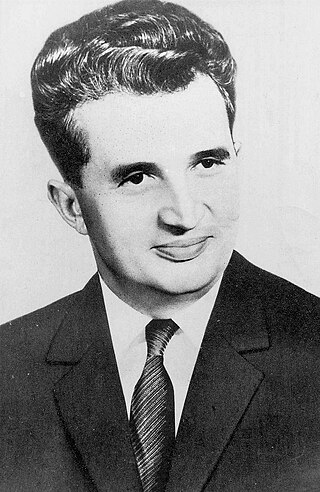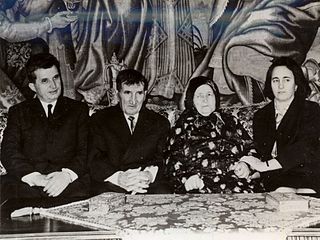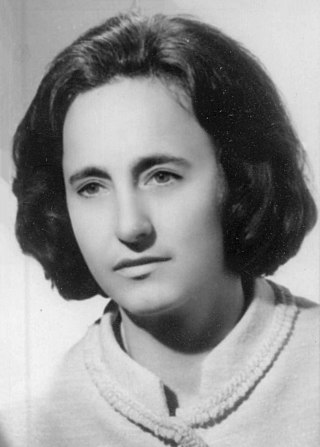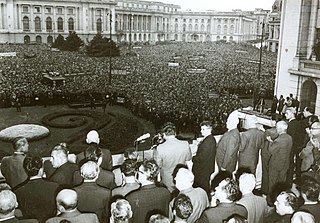
Nicolae Ceaușescu was a Romanian politician who was the second and last communist leader of Romania, serving as the general secretary of the Romanian Communist Party from 1965 to 1989. Widely classified as a dictator, he was the country's head of state from 1967 to 1989, serving as President of the State Council from 1967 and as the first President of the Republic from 1974. He was overthrown and executed in the Romanian Revolution in December 1989 along with his wife Elena Ceaușescu, as part of a series of anti-communist uprisings in Eastern Europe that year.

The Palace of the Parliament, also known as the House of the Republic or People's House/People's Palace, is the seat of the Parliament of Romania, located atop Dealul Spirii in Bucharest, the national capital. The Palace reaches a height of 84 m (276 ft), has a floor area of 365,000 m2 (3,930,000 sq ft) and a volume of 2,550,000 m3 (90,000,000 cu ft). The Palace of the Parliament is the heaviest building in the world, weighing about 4,098,500 tonnes, and is the third largest administrative building in the world.

The Romanian revolution was a period of violent civil unrest in Romania during December 1989 as a part of the revolutions of 1989 that occurred in several countries around the world, primarily within the Eastern Bloc. The Romanian revolution started in the city of Timișoara and soon spread throughout the country, ultimately culminating in the drumhead trial and execution of longtime Romanian Communist Party (PCR) General Secretary Nicolae Ceaușescu and his wife Elena, and the end of 42 years of Communist rule in Romania. It was also the last removal of a Marxist–Leninist government in a Warsaw Pact country during the events of 1989, and the only one that violently overthrew a country's leadership and executed its leader; according to estimates, over one thousand people died and thousands more were injured.

Șerban Vodă Cemetery is the largest and most famous cemetery in Bucharest, Romania.

Romanian rock is a genre of popular music in Romania. It was influenced by changes in Romanian politics to such an extreme, that both the themes and styles of musicians, and the tastes and interests of listeners, changed dramatically with every major event in Romania's internal politics.
Dobrescu is a Romanian surname, derived from the first name Dobrin. Notable people with the surname include:
Voiculescu is a Romanian surname. Notable people with the surname include:
Pârvulescu or Pîrvulescu, a Romanian-language surname, may refer to:

Nicolae Ceaușescu, who led Romania from 1965 to 1989, served as General Secretary of the Romanian Communist Party. Ceaușescu had a large family, several members of which wielded influence in Communist Romania. Below are given outlines of his immediate family members' lives, with links to those who have separate articles about them.

Ion Dincă was a Romanian communist politician and Army general who served as Deputy Prime Minister and Mayor of Bucharest under the Communist regime.

The July Theses was a speech delivered by Nicolae Ceaușescu to the executive committee of the Romanian Communist Party (PCR) on 6 July 1971.
Nicolae is an Aromanian and Romanian masculine given name or surname, the equivalent of the English Nicholas. In Romanian, its feminine form is Nicoleta.

Ghencea Cemetery is located in Ghencea neighbourhood of Bucharest, on Ghencea Boulevard, in Sector 6. The cemetery has two sections, civilian and military.

Elena Ceaușescu was a Romanian communist politician who was the wife of Nicolae Ceaușescu, General Secretary of the Romanian Communist Party and leader of the Socialist Republic of Romania. She was also the Deputy Prime Minister of Romania. Following the Romanian Revolution in 1989, she was executed alongside her husband on 25 December.
Parliamentary elections were held in Romania on 17 March 1985. The Front of Socialist Unity and Democracy (FDUS), dominated by the Romanian Communist Party (PCR) and including other mass organisations, was the only group to contest the elections, and no prospective candidate could run for office without the Front's approval. Consequently, FDUS candidates won all 369 seats in the Great National Assembly, also ensuring the rubber-stamp confirmation of Nicolae Ceaușescu as President of Romania. The Assembly which elected him included several members of the Ceaușescu family, namely his wife Elena, son Nicu, and brother Ilie. Continuity was also ensured by other incumbents, including Nicolae Giosan as Assembly chairman and Constantin Dăscălescu as Prime Minister.

Ceaușescu's speech of 21 August 1968 was a public address by Nicolae Ceaușescu, General Secretary of the Romanian Communist Party and President of the State Council of Romania, strongly condemning the Warsaw Pact invasion of Czechoslovakia. On the night of 20–21 August 1968, four Warsaw Pact nations invaded Czechoslovakia in an effort to quell the reformist ideology of Alexander Dubček, the First Secretary of the Communist Party of Czechoslovakia.
Costin is both a Romanian and English surname and a given name. Notable people with the name include:
This is a list of 1989 events that occurred in Romania.
This is a list of 1967 events that occurred in the Socialist Republic of Romania.
This page is based on this
Wikipedia article Text is available under the
CC BY-SA 4.0 license; additional terms may apply.
Images, videos and audio are available under their respective licenses.











